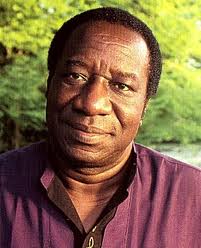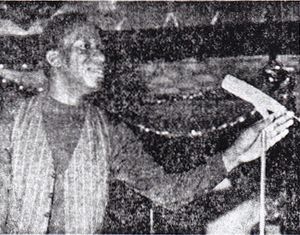Tabu Ley Rochereau facts for kids
Quick facts for kids
Tabu Ley Rochereau
|
|
|---|---|
 |
|
| Background information | |
| Birth name | Pascal-Emmanuel Sinamoyi Tabu |
| Born | 13 November 1940 Bagata, Belgian Congo (modern-day Democratic Republic of the Congo) |
| Died | 30 November 2013 (aged 73) Brussels, Belgium |
| Genres | African rumba |
| Occupation(s) | Singer, songwriter |
| Years active | 1956–2008 |
Tabu Ley Rochereau (born Pascal-Emmanuel Sinamoyi Tabu; 1940–2013) was a very famous singer and songwriter from the Democratic Republic of the Congo. He was known for his unique style of African rumba music. Tabu Ley led a popular band called Orchestre Afrisa International.
He was one of Africa's most important singers and wrote many songs. With guitarist Dr Nico Kasanda, Tabu Ley helped create a music style called soukous. He mixed traditional Congolese music with sounds from Cuba, the Caribbean, and Latin America. People sometimes called him "the African Elvis" because he was so popular. He also had a career in politics later in his life. Tabu Ley wrote about 3,000 songs and released 250 albums during his career.
Contents
Discovering Tabu Ley's Music Journey
Early Steps in Music
Pascal-Emmanuel Sinamoyi Tabu was born in Bagata, which was then called the Belgian Congo. His music career began in 1956. He started singing with Joseph "Le Grand Kallé" Kabasele and his band, L'African Jazz.
After finishing high school, Tabu Ley joined the band as a full-time musician. He sang in the famous song Indépendance Cha Cha. This song was written for Congo's independence from Belgium in 1960. It made Tabu Ley instantly famous across Africa.
He stayed with L'African Jazz until 1963. Then, he and Dr Nico Kasanda started their own group called African Fiesta. Two years later, Tabu Ley and Dr. Nico went their separate ways. Tabu Ley then formed African Fiesta National, also known as African Fiesta Flash.
This group became one of the most successful bands in African history. They recorded classic African songs like Afrika Mokili Mobimba. By 1970, they had sold over a million copies of their music. Many influential musicians, like Papa Wemba and Sam Mangwana, were part of this group. Tabu Ley chose the stage name "Rochereau" because he liked the name of a French general he had learned about in school.
Later Career and Time Away
In 1970, Tabu Ley created his own band, Orchestre Afrisa International. The name "Afrisa" came from "Africa" and "Éditions Isa," which was his record label. Afrisa became one of Africa's biggest bands, alongside Franco Luambo's TPOK Jazz.
They recorded many hit songs such as "Sorozo" and "Aon Aon." They also performed at the Zaire 74 music festival, which was shown in the documentary film Soul Power.
In the mid-1980s, Tabu Ley found a talented young singer and dancer named M'bilia Bel. She helped make his band even more popular. M'bilia Bel became the first female soukous singer to become famous across Africa. Tabu Ley and M'bilia Bel later married and had a daughter.
In 1988, Tabu Ley introduced another female singer, Faya Tess. M'bilia Bel then left to have a successful solo career. After M'bilia Bel left, Afrisa's popularity, along with TPOK Jazz's, started to decrease. Fans began to prefer a faster style of soukous music.
Tabu Ley moved to France in 1988. In 1985, the government of Kenya had banned all foreign music from their national radio. But after Tabu Ley wrote the song "Twende Nairobi" (meaning "Let's go to Nairobi"), praising the Kenyan president, the ban was quickly lifted.
In the early 1990s, he lived for a short time in Southern California. He started to make his music appeal to a worldwide audience. He added more English lyrics and included international dance styles like Samba. He had success with albums such as Muzina and Africa Worldwide. In 1996, Tabu Ley worked on the album Gombo Salsa with the salsa music group Africando. The song "Paquita" on that album was a new version of a song he recorded in the late 1960s.
Return Home and Passing Away
When the government in Congo changed in 1997, Tabu Ley returned to Kinshasa. He became a government minister for the new president, Laurent Kabila. After Kabila's death, Tabu Ley joined a temporary parliament. He also served as a provincial minister of culture. He had many children, including the French rapper Youssoupha.
Tabu Ley Rochereau passed away on November 30, 2013, at the age of 73. He died in a hospital in Brussels, Belgium, after suffering a stroke in 2008. He was buried on December 9, 2013, in Kinshasa, after a special ceremony.
Music Albums
- Contributing artist
- The Rough Guide to Congo Gold (2008, World Music Network)
Awards and Honors
See also
 In Spanish: Tabu Ley Rochereau para niños
In Spanish: Tabu Ley Rochereau para niños
 | Misty Copeland |
 | Raven Wilkinson |
 | Debra Austin |
 | Aesha Ash |


